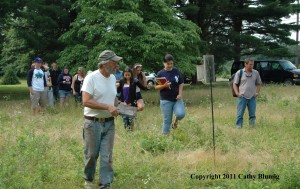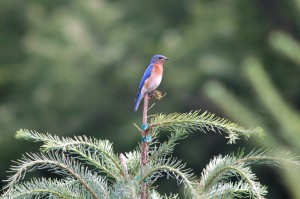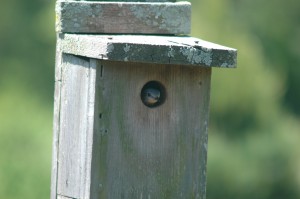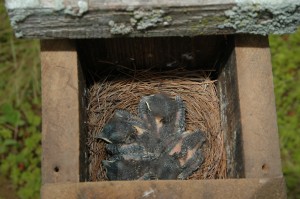Students taking the summer session Environmental Science Lab at Brookdale Community College went on a farm tour of Wolgast Tree Farm this past week to learn about wildlife on our farm, River-Friendly farming practices, beekeeping, Integrated Pest Management and how we grow Christmas trees. 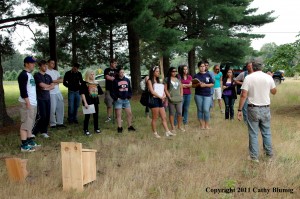
One of the things we talked about was the different types of manmade nesting structures that certain kinds of wildlife will use. To the left of Len on the ground is a roofed nesting platform that can be used by Eastern Phoebes, American Robins and Barn Swallows (far left), and a larger nest box for American Kestrels, which can also be used by Eastern Screech Owls, Gray Squirrels or Flying Squirrels, depending on the habitat where it is placed.
Of course, no farm tour at Wolgast Tree Farm would be complete without mentioning one of our favorite cavity nesters, the Eastern Bluebird. 
A few minutes before the class arrived, Len checked a nearby nest box to make sure the fledglings that were inside weren’t old enough to be flushed from the nest box. Confident that the nestlings would stay put if students took a peek, he placed the roof back in place, but accidentally left behind the screwdriver that he used to open the top. It certainly didn’t keep the adults away as they returned with food to offer the nestlings.
When the class arrived and it was time to look at the nest box everyone was instructed to quietly walk up to the box and take a quick look at the nestlings. Many of the students had never seen an Eastern Bluebird before, let alone young bluebirds still in the nest. It felt good to be able to provide a new experience with nature in this way.
The same thing goes for tree farming. Many people aren’t aware of what goes into producing a Christmas tree so we provided an overview of some of the things that must be done, including shearing. We had finished shearing our pines a week before the class visited, but we saved two so we could demonstrate how our shearing machine works. 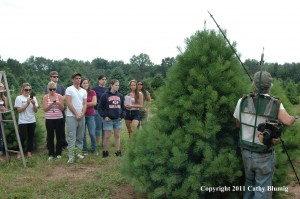 Here Len shows how he uses a SAJE shearing machine to trim back extra growth and produce that perfect “Christmas tree shape”. The backpack that he’s wearing has a motor with a flexible drive shaft that comes around the front and plugs into two 8-foot long blades that are sandwiched together and move back and forth to cut excess growth. It must have made an impression since several students took out their phones and recorded his demonstration.
Here Len shows how he uses a SAJE shearing machine to trim back extra growth and produce that perfect “Christmas tree shape”. The backpack that he’s wearing has a motor with a flexible drive shaft that comes around the front and plugs into two 8-foot long blades that are sandwiched together and move back and forth to cut excess growth. It must have made an impression since several students took out their phones and recorded his demonstration.
Said one student when Len had finished shearing, “There’s a lot that goes into growing Christmas trees.”
Indeed, there is!
